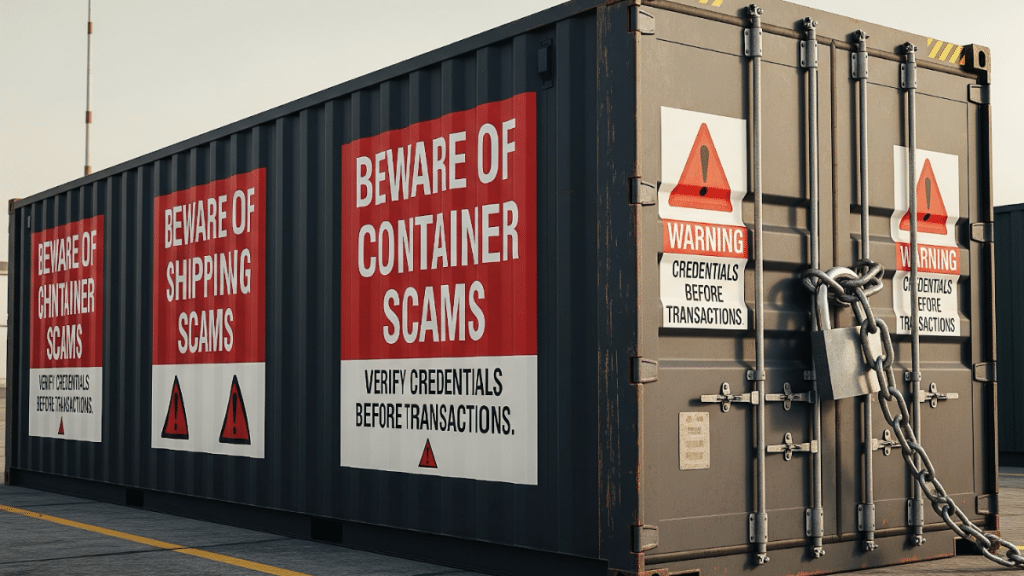Learn how to verify sellers, avoid fake listings, and secure a legitimate container purchase with confidence.
As demand grows for shipping containers—whether for mobile storage, jobsite use, or tiny-home conversions—the risks are evolving right alongside it. While these steel units offer durability and flexibility, the container marketplace has also become a target for fraud. From fake listings to misleading payment schemes, one of the most significant concerns among buyers today is getting scammed.
Fortunately, with a few informed steps, you can confidently avoid common traps and ensure you’re investing in the right solution for your needs.
Why Shipping Container Scams Are Rising in Canada
Increased online demand has given rise to a wave of fraudulent sellers posing as legitimate dealers. These scams often include fake websites, stolen business identities, and deeply discounted prices to lure buyers into sending upfront payments. One notable warning comes from the Better Business Bureau, which recently flagged an uptick in shipping container scams targeting individuals and small businesses alike.
Typical red flags include:
- Sellers refusing in-person inspections
- No company phone number or traceable business email
- Requests for e‑transfer or wire payments with no invoice
A safer approach begins by recognizing these warning signs and insisting on verifiable business credentials before moving forward.
The Price Trap: When “Too Good to Be True” Is a Warning
With prices ranging between CA$2,700 and CA$6,000 depending on size, age, and condition, a suspiciously low offer should always trigger scrutiny. While a deal on a used 20-foot container might look attractive, it may indicate hidden damage—or worse, a seller that won’t deliver at all.
Look for listings that provide:
- Transparent pricing breakdowns
- Photos of the actual unit (not stock images)
- Local delivery estimates with clearly stated timelines
It’s essential to ask for recent photos, verify the container’s location, and, if possible, inspect it before committing to a purchase.
Payment Flexibility & Paper Trails Matter
Another frequent concern in the container market is payment risk. Scammers often insist on instant transfers—typically via PayPal, Interac e‑transfer, or wire—to avoid chargebacks or traceability.
Legitimate sellers typically offer:
- Multiple payment options including credit card, cheque, or corporate invoice
- Clear, itemized invoices outlining product, taxes, and delivery costs
- Written contracts that confirm delivery schedule, container specs, and return policies
These documents protect you as a buyer and serve as legal proof in case of disputes.
Know What You’re Buying: Understanding Container Grades
Shipping containers are categorized by their condition—from one-trip (almost new) to as-is (often damaged). Without seeing the container in person or through a verified photo set, you may receive a unit that doesn’t meet your expectations.
Here’s a simple breakdown:
- New/One-trip: Minimal wear, paint intact, ready for modification or display use
- Cargo-worthy: Wind- and watertight, structurally sound, can be certified for overseas use
- Wind and Watertight (WWT): Great for static storage but may show signs of rust or wear
- As-Is: May have leaks, structural issues, or be unsafe for stacking or lifting
Ask the seller to specify the grade and provide third-party inspection photos when available. Don’t rely on general condition claims like “great shape” without supporting documentation.
Logistics You Can Count On
Even after verifying the product, another issue buyers face is unreliable delivery. Delays, unconfirmed drop-off times, and access problems can derail your entire project.
When arranging delivery, consider the following:
- Is the site accessible? Ensure there’s enough clearance for trucks with tilt-deck or flatbed trailers.
- Who handles logistics? Use vendors who coordinate directly with certified haulers.
- What’s the lead time? Verify expected delivery within a specific window (typically 3–7 business days).
Reliable vendors will help with site prep requirements and offer tracking or confirmation prior to delivery day.
Getting Into Modifications? Ask the Right Questions
Containers are increasingly used beyond storage—converted into offices, shops, and even permanent dwellings. But customization without proper planning can result in costly errors or code violations.
If you’re exploring modifications, ensure:
- All alterations meet local building codes and zoning laws
- Structural changes are handled by licensed professionals
- Insulation, electrical, and plumbing are rated for your region’s climate
Before cutting into steel, it’s also worth discussing your plans with the seller or an engineer to avoid compromising container integrity.
Anchoring Trust: Where to Begin Your Search
If you’re navigating the container marketplace for the first time, prioritize established sources with transparent online presences. Forums and regional groups can also offer insight. For example, users in Ontario frequently flag local Facebook Marketplace scams and share reliable vendors.
When in doubt, review:
- Verified seller reviews
- Industry directories or shipping container associations
- Resources that link directly to regulated vendors or importers
You can begin exploring container types and Shipping Containers currently available for sale through reputable providers to understand pricing and regional availability.
Conclusion
As with any high-value purchase, buying a shipping container requires more than a quick scan of online listings. Scammers often prey on urgency and inexperience—two things you can actively guard against by doing your homework, requesting documentation, and working only with verified sellers.
Whether you’re looking to store inventory, build out a custom site office, or convert a unit into a livable structure, the best investment begins with a safe and informed purchase process.
Additional Resources
Explore Available Shipping Containers for Sale in Canada | Sea Can Guys
Find a Better Business: The BBB helps people find businesses they can trust. | Better Business Bureau
